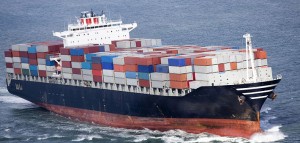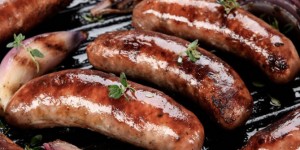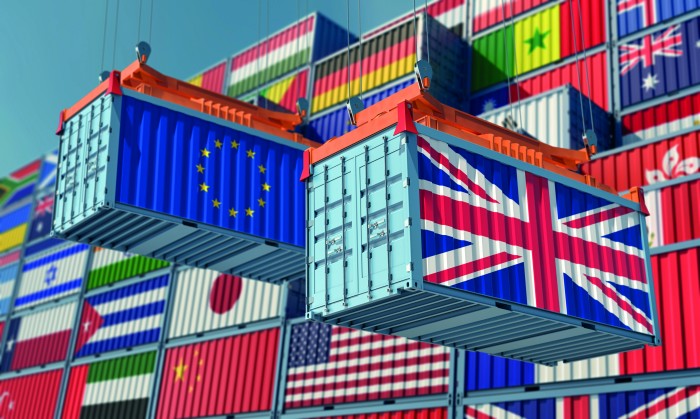The start of 2021 heralded a new era as the UK formally departed the EU Single Market and Customs Union, with significant implications for the pig sector. ALISTAIR DRIVER looks at some of the ways this will affect the pig sector.
At 11pm on December 31 – four-and-a-half years on from the fateful June 2016 Referendum vote – the Transition Period ended and Brexit finally happened ‘for real’.
The UK has now formally left the EU Single Market and Customs Union and is classified as a ‘third country’ for the purposes of trade, meaning a whole new set of requirements for both export and imports.
Few sectors of the UK economy stand to be affected more by Brexit than pork. Between January and October of this year, the UK imported 676,000 tonnes of pigmeat products from the EU, while 182,500 tonnes went the other way, AHDB figures show.
The two-way trade is critical for the pork supply chain, playing a key role in balancing the carcase on both sides, while the UK is also reliant on the EU some key inputs, including feed ingredients and medicines.
The pig sector is affected in various ways – from some of the big political issues to all sorts of extra requirements and paperwork.
The EU-UK trade deal
 The big news just before Christmas was, of course, the agreement on the EU-UK trade deal, which brought a big sigh of relief from across agriculture.
The big news just before Christmas was, of course, the agreement on the EU-UK trade deal, which brought a big sigh of relief from across agriculture.
The main implication of this for pigs and the wider farming sector is that tariff free trade will continue, avoiding the imposition of significant tariffs on goods travelling both ways.
For pigs, this could in the short-term at least, have supported domestic production and prices by making EU significantly more expensive. Against that, producers could have faced potentially higher input costs, while exports, notably of cull sow carcasses, would have been rendered unviable, with implications generally for carcase balance.
However, the UK’s departure from the EU Single Market and Customs Union and departure from EU rules on product standards in some cases means there will still be added bureaucracy and costs associated with EU trade, both ways, and potential delays at ports.
There will also be restrictions on exports of some animal products, including fresh pork mince and sausages.
AHDB head of strategic insight David Swales said 60% of our food, feed and drink exports in 2019 headed to the EU, which provided 70% of our imports.
“Although reaching a trade deal with the EU means that the eye watering tariff for many food products between EU and UK will be avoided, changes to that close relationship still means increasing costs and complexities due to the fact that the UK will be leaving the single market and trading with the EU as a third country,” he said.
“This trade friction, in the form of additional paperwork, physical checks and labelling requirements will squeeze the already tight margins within the supply chain.”
AHDB analysis estimates these costs range from 5% to 8% for livestock products and 2% to 5% for crops, with farmers likely to ‘bear the brunt of these additional costs’.
“These estimates do not include the cost of potential delays at port, which may result in a further loss of value of perishable loads,”Mr Swales added.
Other trade deals
The UK has made deals to continue trading in the same way with 62 of the 70 countries that have trade deals with the EU and that the UK was automatically part of. Deals have also been agreed with Canada and Mexico, which are due to start ‘in early 2021’ and talks are ongoing with a further six countries or blocs.
In addition, the UK signed a deal with Japan in October, which differs from the existing EU deal and is holding trade talks with the US, Australia and New Zealand. The concern for the pig sector, particularly regarding a US deal, is the threat of a deal paving the way cheaper imports produced to standards that would be illegal to produce in the UK.
Tariffs
While the prospect of tariffs on UK-EU trade finally disappeared on Christmas Eve, the Government’ UK Global Tariff will apply to all countries where direct ‘free trade agreements’ are not in place.
The good news is that, in contrast to its original plans, UK’s new default tariffs mirror EU tariffs, including:
- Fresh or chilled boneless pork – £72/100kg
- Fresh or chilled with bone in hams – £65/100kg
- Hams, prepared or preserved – £131/100/kg
- Uncooked sausages – £125/100kg.
OTHER BREXIT ISSUES
Despite the welcome trade deals, there are numerous other issues that will affect the pig sector. Just before Christmas, the EU granted third country listing status to the UK, enabling exports of meat, dairy and other products of animal origin to continue – but with various new conditions.
UK Chief Veterinary Officer, Christine Middlemiss, said: “If you or your business imports or exports animal and animal products, or imports high risk food, then I urge you to visit our guidance pages on gov.uk for what you need to do to continue to trade after December 31.”
Guidance for animal importers and exporters including equine transporters is available on the Government website.
Export Health Certificates
From January 1, all exports of live animals, products of animal origin (POAO), animal by-products and germplasm from GB to the EU need to be accompanied by an Export Health Certificate (EHC).
It must be signed by an Official Veterinarian (OV’s), who will be paid by the exporting company, confirming that the goods being exported meet the health requirements of the destination country.
Cloven-hooved animals
In order to enable pork exports to continue, the OV must have evidence that pigs have been kept separately from wild cloven-hoofed animals, with appropriate housing and/or fencing.
Producers will need to provide an attestation on eAML2 confirming as such and private vets will be asked to issue a statement, where appropriate, showing this is the case.
The NPA has been working with vets, processors, AHDB, Defra, the Food Standards Agency, Food Standards Scotland and the British Pig Association, on the evidence that will be required in order for the vet to sign such a statement.
This will require producers to:
- Update your production information held in the Pig Hub by indicating that you have a quarterly vet statement confirming separation. The information will feed into eAML2 and your licence.
- Confirm on the eAML2 online form that the pigs you are shipping have also been farmed separately from wild cloven-hoofed animals from birth, providing assurance if the pigs weren’t born on your unit. However, if your entire supply chain is Red Tractor assured, then you will be able to automatically answer ‘yes’ to this question.
If you submit your movements on a CSV file via the eAML gateway, you will need to ensure:
- All your holdings are updated with the confirmation that you have the new Quarterly Veterinarian Certification on Pig Hub.
- That you use the new CSV template which can be downloaded from eAML system.
“The vet certificate will be needed, so the vet at the abattoir can sign the EHC,” NPA chief executive Zoe Davies said.
“It will be re-issued roughly every three months but will stay with you – this will need to be kept in case the processor is audited as some point by the EU.”
While this will be an added burden, she stressed that it was the ‘easiest fix we could find in the short time we had’ to allow pig meat to exports to continue’. The NPA is hoping the requirement will be removed in future.
Breeding pig exports
 There will be no exports of breeding pigs to the EU for the first few months of 2020, at least. This is due to a lack of Border Control Posts (BCPs) that are now required so pigs can be inspected at EU seaports.
There will be no exports of breeding pigs to the EU for the first few months of 2020, at least. This is due to a lack of Border Control Posts (BCPs) that are now required so pigs can be inspected at EU seaports.
The UK exported more than 13,000 breeding pigs in 2020 and it is hoped the trade could resume at some point in 2021.
The Government has made it clear this is a commercial issue for the ports and the breeding companies and NPA and NFU have been in direct contact with many of the ports, but few are showing an interest in setting one up.
The same requirement for UK ports for imported pigs does not come into force until July 1. The NPA has also been in contact with UK port authorities to discuss BCP development for live imported pigs as there are no BCPs at any seaports on the UK side either.
Rattlerow UK sales manager Simon Guise said: “We will not be able to export breeding pigs from January 1 so it is imperative that we convince ports to set up BCPs and support them where possible to do so.
Trichinella testing
As a third country, the UK pig sector could have faced a requirement for all pigs to be tested for Trichinella to enable pork exports to continue.
In order to avoid this, the UK has to set out a case to convince the EU that the pig sector is applying controlled housing conditions (CHC). The NPA has been working closely with Defra and others to try and provide the evidence needed to prove this and discussions are on-going with the EU, but they have allowed trade to continue for now until the final decision is taken.
While processors already test seven million out of the 10 million pigs going into the supply chain, an additional testing requirement would add an extra burden and costs for many, Dr Davies said.
Northern Ireland protocol
One of the most difficult of all the Brexit issues was resolved in early December with agreement on the protocol governing how goods will be move across the Irish border and between GB and Northern Ireland.
In order for frictionless trade across the border, there needs to be some checks on goods trade between GB and NI, regardless of whether there is an EU trade deal.
But there will be a three-month grace period from certification, such as export health certificates, phytosanitary certificates or marketing standards certification, through to April 1 for some trade in pork and other products of animal origin.
This will mainly apply to goods solely destined for sale to end consumers in supermarkets located in NI.
“Live animals moving from GB to NI already undergo checks on arrival and the new controls build on these existing processes with documentary, identity and physical checks at the designated point of entry. Import licences may also be required from DAERA,” NPA senior policy adviser Charlie Dewhirst said.
Mince ban
 Among a list of ‘prohibitions and restrictions’ (P&R) our third country status brings is a ban on exports of fresh mince and mince products, which will, for example, prevent pork processors sending fresh sausages to the EU.
Among a list of ‘prohibitions and restrictions’ (P&R) our third country status brings is a ban on exports of fresh mince and mince products, which will, for example, prevent pork processors sending fresh sausages to the EU.
There is also a ban on re-exporting meat products made from meat imported from the EU that has been processed in the UK and sent back, which could, of course, help UK producers.
Labelling
Defra has listed a long list of guidance on its website on changes to country of origin labels, EU health and identification marks, organic logos and much more. For example, food from GB must not be labelled as ‘origin EU’.
Import notification
GB importers will no longer have access to the EU’s import system TRACES. They now need to use the e the UK’s new Import of Products, Animals, Food and Feed System (IPAFFS) for imports of live animals and products of animal origin (POAOs).
Export delays
 After a relatively quiet start with little sign of the feared queues at ports, reports started to come through of problems for exporters in the last week of January.
After a relatively quiet start with little sign of the feared queues at ports, reports started to come through of problems for exporters in the last week of January.
The NPA has learned that pork exporters are now experiencing delays at Calais because of lengthy vet checks. This, in turn, is impacting on product shelf life and therefore the value of trade, NPA chief executive Zoe Davies said.
While the first few days of 2021 saw significantly reduced trade flow compared to this time last year, there are concerns that the situation will worsen as freight volumes return to normal levels after this quiet start.
On Friday (Jan 8), the BBC reported that the new border controls were already creating problems for exporters and traders.
Shane Brennan, chief executive of the Cold Chain Federation, which represents chilled transport and storage companies, said there was a ‘growing problem and sense of unease’ among its members as problems have emerged, despite the amount of cross border traffic still being quite low.
“Trade flows are still only about 50% of what we would expect, but even at those levels we are seeing levels of confusion and delays,” he told the BBC’s Today programme. “The feeling is we are building to quite a significant potential disruption.”
Retailer M&S said the new trade arrangements were creating ‘very complex administrative processes’. The red tape burden, along with potential tariffs on some exports ‘will significantly impact our businesses’ in Ireland, the Czech Republic, and France, it said.
A government spokesman acknowledged that there had been ‘some issues’, but said ministers had always been clear there would be some disruption at the end of the transition period.
In a letter to Defra Secretary George Eustice in December, the UK’s biggest meat companies, including Pilgrim’s, Cranswick and Karro, and various industry organisations, including the NPA, NFU, and the British Meat Processors Association (BMPA), warned of a potential crisis due to the volume of additional red tape, including EHCs, and the lack of veterinary resource to process it.
This could bring the £1.6bn UK meat export trade to the EU to a standstill, the BMPA warned. The association said there were simply not enough vets who will be in the right place at the right time to inspect the loads, verify traceability paperwork and sign the EHCs.
Defra has estimated that an additional 300,000 EHCs will be needed per year, but, according to BMPA chief executive Nick Allen, that total could be easily surpassed by just four companies in beef and lamb consignments alone.
The BMPA was also concerned that the Government’s new EHC online application portal, has not been stress tested to see if it will cope with the huge flood of extra applications.
Defra acknowledged that there are ‘a range of challenges’ in estimating both the number of EHCs that will be required and the availability of certifiers.
A spokesperson said the Department was ‘working hard to increase the number of official certifiers’.
“We have doubled the number of Official Veterinarians qualified to sign EHCs for animal products since 2019, and we are providing funding for surge capacity veterinarians as short term support for the end of the transition period.”
Defra said it has opened applications for a new Groupage Export Facilitation Scheme (GEFS) designed to facilitate the export of certain animal product with ‘complex but stable supply chains’, such as supermarkets.
It also said EHC Online, which has so far been used to process 24,000 EHCs, has been stress tested ‘above and beyond the anticipated increase in EHC applications’.
Medicine availability
The National Office of Animal Health said most veterinary medicines on the UK market come from or via the EU. Commenting before the trade deal with the EU was agreed, it said: “An EU trade deal with practical arrangements at borders is a key priority to ensure the smooth movement of products from January 1,” it said.
“Animal health companies have worked very hard on EU exit preparations and contingency planning both in terms of regulatory requirements and their supply chains such as warehousing, stocks and routes. There is a good degree of confidence for the continued availability of animal medicines.”
“But if delays around Kent and the Dover-Calais short straits become protracted lasting for several weeks to months, then this could potentially eventually cause a supply issue, outside of the animal health industry’s control.”
Guidance
While there are many gaps, lots guidance has been published on the https://www.gov.uk/transition website, including:
- Exporting or moving live animals and animal products to the EU or Northern Ireland –https://www.gov.uk/guidance/exporting-animals-and-animal-products-to-the-eu-from-1-january-2021
- Importing or moving animals, animal products and high-risk food and feed not of animal origin – https://www.gov.uk/guidance/importing-animals-animal-products-and-high-risk-food-and-feed-not-of-animal-origin-from-1-january-2021
- Export health certificates – https://www.gov.uk/guidance/get-an-export-health-certificate
- Labelling – https://www.gov.uk/guidance/food-and-drink-labelling-changes-from-1-january-2021
- Regular updates can also be found on the NPA and Pig World websites.




